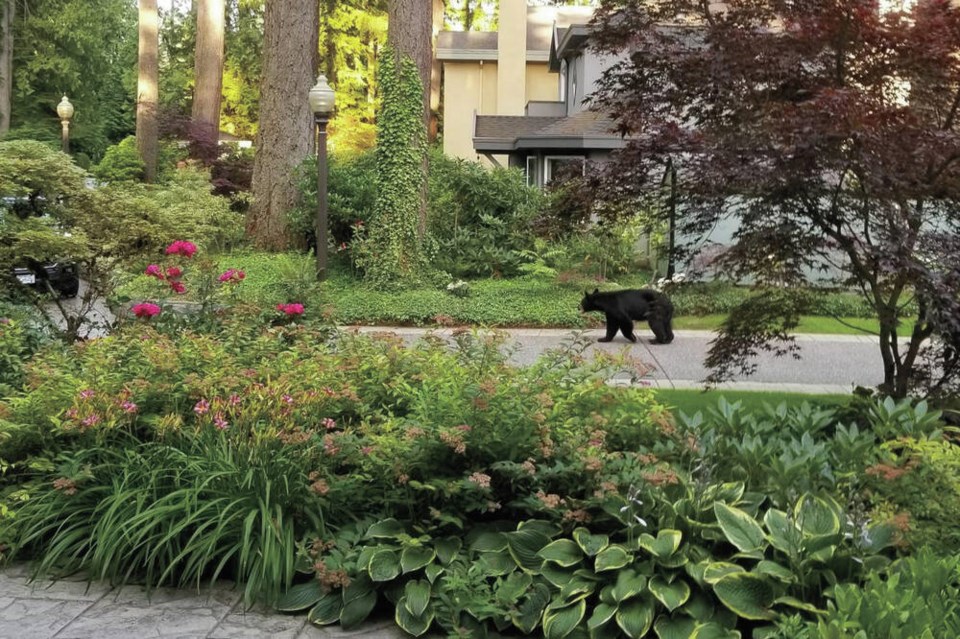A bear was killed by conservation officers in North Vancouver last week, which local bear experts say should never have happened.
How could this have been prevented? Bears need to be taught boundaries, and people need to keep their properties free of enticing scents.
The black bear that was put down – after a video of it raiding a freezer inside someone’s home was viewed millions of times on TikTok – was a mature bruin that had developed a taste for frozen foods.
“We know he [also] got into a freezer in an outdoor shed,” says Christine Miller from the North Shore Black Bear Society, adding that it’s hard to wean a bear off that kind of food source once it gets used to it. The bear probably found some other freezers in carports, she said.
Another mistake in this case was filming the video. According to Miller, people should resist the temptation to pull out their phones, and instead focus on being assertive and telling the bear to buzz off.
If everyone does their part to make their homes less attractive to bears, there will be less sad stories like this one to tell.
Here’s how to make your home bear safe:
Get rid of smells
The main draw for bears is tantalizing smells. At the top of the list is edible things, but even scents like leftover bear spray (don’t mist your property with this stuff) can become attractants.
That also means doing things like picking your fruit trees early, storing your pet food indoors, and keeping your barbecue clean – which includes emptying your grease-catcher.
Freezers should be stored inside secure garages or inside your home.
One exception, Miller said, is pine-scents. She recommends cleaning out your bins with a pine-scented cleaner.
Miller, who keeps her North Van yard very clean, said bears have never been onto her property. “They just walk by the fence.”
Store and maintain your bins properly
The Conservation Officer Service said the main attractant for food-motivated bears is improperly stored bins.
Don’t leave them unlocked and loose in your yard. Ideally, store them in your garage. If you can’t do that, secure them so they stay in an upright position. As bears typically knock bins over to feast on the contents, strapping them with bungee cords to a post can make that harder to do.
If your bins have locks, like they do in the District of North Vancouver, keep them locked and stored until collection day. However, a lock won’t necessarily stop a determined bear.
Keep food scraps out of garbage cans. This is important as garbage is picked up later in the day, often long after green bin collection in the morning.
Store meat and fish scraps in your freezer, and only put them in the green bin on collection day. Other food scraps should be wrapped with newspaper (a great way to recycle an old edition of the North Shore News) and separated with yard clippings.
A reminder that people who improperly store their waste can face a $230 fine under the Wildlife Act.
Teach bears to stay off your property
If a bear shows up at your front door, “Don’t take your cellphone out,” Miller said. “You need to tell the bear it’s not welcome.”
As some bears have become accustomed to noise, turning on your car alarm might not be enough to scare one off.
Experts recommend that you assert your dominance. Make yourself big and in a loud voice tell the bear to leave. If that doesn’t work, you can throw small rocks at it or even water balloons.
To prevent bears from walking into your home, keep your door closed. Some advocates recommend buying an electrified door mat.
Ask an expert
Miller said the Black Bear Society is very accessible to residents on the North Shore.
“We appreciate hearing questions from people,” she said. “We’re here to support people so they don’t have issues and fears. We try to keep them feeling safe and keep it safe for bears.”
For more tips, visit the North Shore Black Bear Society website. North Van District also has a guide to make your garbage and organics carts less attractive to bears and other animals.




